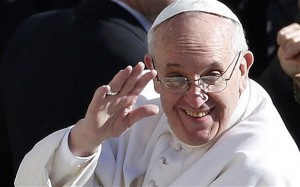The Weekly Francis is a compilation of the Holy Father’s writings, speeches, etc., which I also cross-post on Jimmy Akin’s blog.
This version of The Weekly Francis covers material released in the last week, from 2 November 2023 to 8 November 2023.
Angelus
General Audiences
Homilies
- 2 November 2023 – Commemoration of all the faithful departed (Rome War Cemetery)
- 3 November 2023 – Eucharistic Celebration in memory of the late Supreme Pontiff Benedict XVI, and the Cardinals and Bishops deceased during the year
Speeches
- 4 November 2023 – To the participants in the meeting organized by the Catholic Charismatic Renewal International Service (CHARIS)
- 6 November 2023 – To a Delegation of the Conference of European Rabbis
Papal Instagram


